Photo by Pixabay | pexels.com
Climate Justice, Decolonialisation and the Role of Cultural Relations
- Event
- Date
-
- Location
- online
While the countries of the Global North are responsible for the majority of historical CO2 emissions, the impacts of climate change and the capacities to deal with it are very unevenly distributed. Particularly affected by climate change are countries in the Global South – many of them former colonies still struggling with the socioeconomic consequences of colonial exploitation.
This twofold injustice is at the core of demands on rich countries to own up to their historic emissions responsibilities, aid poorer and vulnerable countries in adapting to climate change and to financially compensate those affected by climate-related loss and damage. Despite the historic decision at the recent COP27 to establish a fund to cover loss and damage, the issues of responsibility and concrete financial commitments remain difficult. These demands overlap with processes of dealing with colonial history, as well as with debates on how people and societies worldwide will have to change their lives in the coming years to cope with climate change.
To tackle these issues, interdisciplinary approaches are needed, as well as greater societal engagement. Artists and cultural relations actors already play an important role in fostering cross-cultural understanding and empathy in other domains. Cultural relations between states and societies could thus be an important component of international climate policy and transnational climate action. This panel therefore discusses the following questions:
- Climate Justice: What is meant by climate justice? What are trends and main positions in the debates around climate justice and loss and damage?
- De-colonisation and climate change: How are climate change, climate justice and decolonialisation intertwined and where are they at odds? What opportunities and challenges exist in linking these issues and processes?
- Climate and culture: How can actors from the cultural sector and cultural relations play a constructive role in climate policy, and in debates on climate justice and decolonialisation?
Panellists:
- Ann Pettifor, Fellow, New Economics Foundation, UK
- Nnimo Bassey, environmental activist, poet and director of Health of Mother Earth Foundation (HOMEF), Nigeria
- Tonny Nowshin, Finance Campaigner, TheSunriseProject




